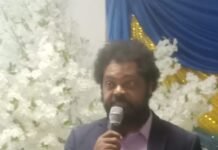The Independent Media Commission, IMC, has introduced a new bill titled Independent Media Commission Act, 2020. This bill without hesitation is bound to violate both human and business rights. The bill, if allowed to pass through parliament and become law without objections, will dangerously erode media practitioners’ interests in favour of political interests, the latter is aimed at direct censorship of the media.
The bill puts the IMC in the latest view of the public especially the media as a vampire that has created the worst nightmare for journalists in such turbulent times in the country when we face a national pandemic. The pandemic of COVID-19 has badly affected the media to such extent that the COVID-19 Media-mania has brought a lot of financial shortfalls in businesses, scared advertisers to suspend and or cancel contracts, exposed the media’s limited knowledge about reporting pandemics, shut down some businesses while others downsize or entirely laid off staff etc.
In the midst of such situations, came the Administration’s bogus claims of addressing the shocks created by the pandemic through the Quick Action Economic Response Programme of the Government, which unfortunately has excluded the media from gaining such benefits in order to cushion the shocks or losses accrued from the terrible blow of Corona Virus pandemic.
Instead of an economic stimulus, the Government has further given a red flag waving to members of the profession indicating that the best moment to change the narrative is neigh, and they do not seem to mince their words as expressed by their intentions in the bill. Reasons for the new bill were not spelt out clearly but citations have already exposed the government’s grandiose plan to control public opinion especially negative one against it by targeting critical media it thinks or believes would be affected by the new law.
The underdog in this enterprise is the IMC – the main government agency for regulating the media. Though sources claim that it is not alone in consultations of opinions and expert advice and other input in drafting the bill, pointing fingers at Sierra Leone Association of Journalists, Guild of Editors, etc of connivance, allegations the authorities have failed to respond to, yet the IMC has come under the spotlight being accused of trying to ostracise the media through stringent measures introduced in the bill such as the elimination of the right of sole proprietorship, interference in the newspaper’s business in terms of monitoring its financial regime administration, rigorous renewal processes as same as the application, etc. .
These are but a few of the accusations thrown at the Independent Media Commission in the bill, as the question whether the IMC violates human and business rights of sole proprietors increasingly attracts attention.
The complexity of the provisions involved and the polarisation of the powers to be assumed by the IMC means that many media practitioners were still confused as to the importance of this new bill and its benefits to the country, the media profession and to the public, including Journalists themselves.
John Koroma is a Commonwealth Press Institute alumni in Business Journalism and is the Managing Editor of The Nation: Business & Finance newspaper in Freetown, and also a human rights activist and defender with the non-profit humanitarian organisation – Stop It-Sierra Leone.
Koroma decided to look into the issue of the hullabaloo that has rocked the media in consternation in order to better understand the human and business rights issues arising in the IMC bill.
Firstly, he said, the media must distinguish (1) between the objects and functions of the IMC and their relationship with the Ministry of Information and Communications and (2) between the different types of opinions held by practitioners about the repeal of the Public Order Act in order to determine whether the bill contained a violation of human and business rights issues arising from the arguments.
Distinguishing the IMC’s Objects and Functions in the Bill
According to the bill, the IMC which has commissioners headed by a Chairman that is appointed by the President will operate as a High Court with prosecutorial and judgemental powers that are final, unless the appellant goes to the Court of Appeal before a matter of its decision is rescinded or stands otherwise what they say is final. Looking at the bill, the IMC’s objects are as follows:
- Promote a free and pluralistic media industry throughout Sierra Leone
- Ensure that media institutions achieve the highest level of efficiency in the provision of media services;
- Promote fair competition amongst media institutions and persons engaged in the provision of media services
- Protect the interest of the public against exploitation or abuse by media institutions;
- Promote communications and media research and development of human resources for the advancement of media industry throughout Sierra Leone.
On this background, the first two objects of the Commission must be looked at clearly. The beautiful words used there and still maintained by the new bill are, Part III Section 11 (a) free and pluralistic. Simply, these mean that the right to the registration and operation of a media institution must not be thwarted by the IMC with stringent measures, but guaranteed with the freedom to own and operate as plenty as available within the ambit of the law such media institutions that the IMC may guide and encourage during their practice to gradually mature to achieving the highest level of efficiency Part III, Section 11(b) of the bill.
Now, let us look at the main functions of the IMC as follows:
- Advice the Minister on Media Policy formulation and development
- Ensure compliance of the Act (2020), i.e, ensuring that media practitioners who operate under the Act fully implement it
- Establish categories of licenses and grant such licenses to media institutions in Sierra Leone
- Prescribe minimum percentage of total broadcast hours to be devoted to public service programmes by various types and categories of electronic media institutions
- Maintain a register of print and electronic media institutions in Sierra Leone
- Establish clear limits in media ownership including cross media ownership
- Establish, monitor, and enforce a media code of practice throughout Sierra Leone in consultation with the Sierra Leone Association of Journalists and other media practitioners, and
- Do all such things as may contribute to the attainment of the objects of the Commission
The above shows that the IMC is an agency or department of the Ministry of Information and Communications, therefore it is one of the members of the Government of Sierra Leone, meaning that any policy initiative or decisions that come from the government they will do without thinking in the interest of the media practitioners. The summation is that the IMC is not totally independent as it claimed and that some key decisions are made or being influenced negatively by Government through the supervising ministry.
Identifying the Issues
(1) Right to Sole Proprietorship eroded
Like the big economies fight in the trade wars, they often impose sanctions on commodities, goods and services on weaker nations with the objective of ensuring compliance and respect of a standard, or rule. But just as the sanctions always fail their targets and instead would result to more woes and mistakes so the IMC’s perception of its bill – to withdraw one bad law and replace it with another will create a disaster.
There is nowhere in the world that eliminates Sole Proprietorship as a business right. Sierra Leone is the only country on earth where that is about to be attempted to happen if such a bill succeeds without being vetted. The new bill deliberately silenced on Sole Proprietorship and there was nowhere mention of it instead it emphatically puts it as a condition that registration to operate a media house shall now become mandatory a corporate body.
The intention of the bill in this area might in two ways: good or bad. Good in order to “Ensure that media institutions achieve the highest level of efficiency in the provision of media services” when you operate as company; and also bad because the right to Sole Proprietorship is a fundamental human and business right which cannot be stolen away from the people including media practitioners who 98% own their media houses and do not have the connections for partnership investment or doesn’t consider it a safer way to bet their chances. It’s all about choice, and choice is a human right which must be respected and upheld.
The IMC thinks that its new bill which is intended to replace an old or existing one (1965 Public Order Act) would cause media practitioners to avoid committing what former U.S. Ambassador to Sierra Leone H.E. Thomas N. Hull (2004) called “Intellectual Corruption” by Journalists, would happen.
They firmly believe that by corporatizing media institutions it will lead to committing fewer offences, create protectionism for public figures and ease negative opinion against government because the media institutions would be controlled by boards that influence the decisions of such institutions….it is mistaken. Obviously, many Managing Editors and Editors the like are resisting the bill because of its awkward provisions.
(2). Violation of the Right To Privacy.
The IMC clearly exposes itself here when it attempted to control or determines auditing services for the media institutions. This violates both the human rights of the owner and the business rights of the institution. This particular provision poses a threat to human rights, particularly the right to privacy. The result of this would make the relationship between the IMC and the media institutions particularly harsh in compliance with the regulations.
(3). Rigorous Registration and Renewal
Sierra Leone since 2008 was opened to the world for business and this has put the country on a vantage point of doing business with ease. The Doing Business with Ease has helped the country so much that it saw from 2008-2018 floods of businesses and investments from both local and international partners that boomed the economy because most of the bottle-necks that once impeded the flow of business before this era were being wiped out.
The IMC bill is not considerate in this case as its intention is to hold some businesses aback for either political or selfish interests to the detriment of the individual or the public. If the Commission succeeds with its bill to have this provision maintained, then the likelihood of Sierra Leone slumping back to the Ease of Doing Business is reversed.
The Way Forward
Media practitioners must come together and give the IMC and its bill a cruel blow that will send them both to the redrafting room before the House of Parliament sits to debate the bill. The media should work in collaboration with civil societies, legals, MPs, trade unions, etc to raise eyebrows over the bill and put strong points of objections to the bill to the respective authorities in parliament in respect of their views and opinions or arguments with the bill. Further, lawyers from both the trade and human rights fields must be engaged with citations of the contested grey areas.
In consideration of the two main roles of the industry being both a profession and a trade, it is strongly recommended that greater attention must be given to trade owing to its importance of economic considerations and benefits both to the owner/owners and to the public.
In conclusion, the bill titled Independent Media Commission Act 2020 is a complete violation of the human and business rights of individual members of the media profession trading in it. It won’t do well to build a strong and ethical regime in the media as an objective rather would create the worst nightmare government and especially the IMC would face as a backlash for its phantasy dream of trying to control negative opinion against government through the bill.
Honestly though there a few good aspects of the bill, yet to a large extent its provisions or measures clash with human rights, business rights and international human rights and trade treaties Sierra Leone has entered into. Though it is time to change the narrative which has also been part of my campaign for the Editors’ Guild Chairmanship, yet such change should not kill the media.






























